Home >Technology peripherals >AI >'The magical journey from ChatGPT to a daily income of 14,000 yuan”
'The magical journey from ChatGPT to a daily income of 14,000 yuan”
- 王林forward
- 2023-04-26 08:28:061367browse
This article is reprinted with the authorization of AI New Media Qubit (public account ID: QbitAI). Please contact the source for reprinting.
Use ChatGPT to write a blog, and you can actually achieve a daily income of over 10,000!
No kidding, this really happened.
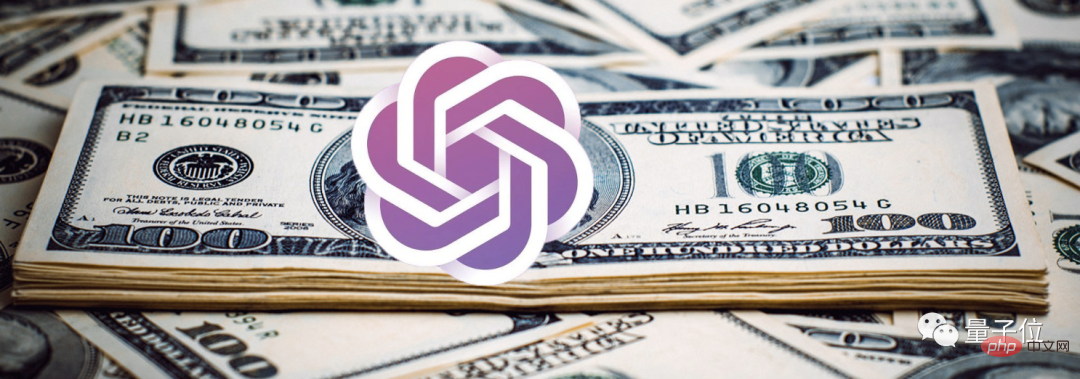
The cause of the incident was that a young lady was preparing to publish a data analysis article with a word count of about 3,000.
But she felt that it was a bit too troublesome to analyze the data and sort out the text content at the same time, so she had an idea and asked ChatGPT for help.
At first, she didn’t have high expectations for the results, but when the profit figures came out, she was shocked:
Daily income2000 US dollars (about 14,000 yuan) , it’s hard to believe that an article written by AI can be so influential!
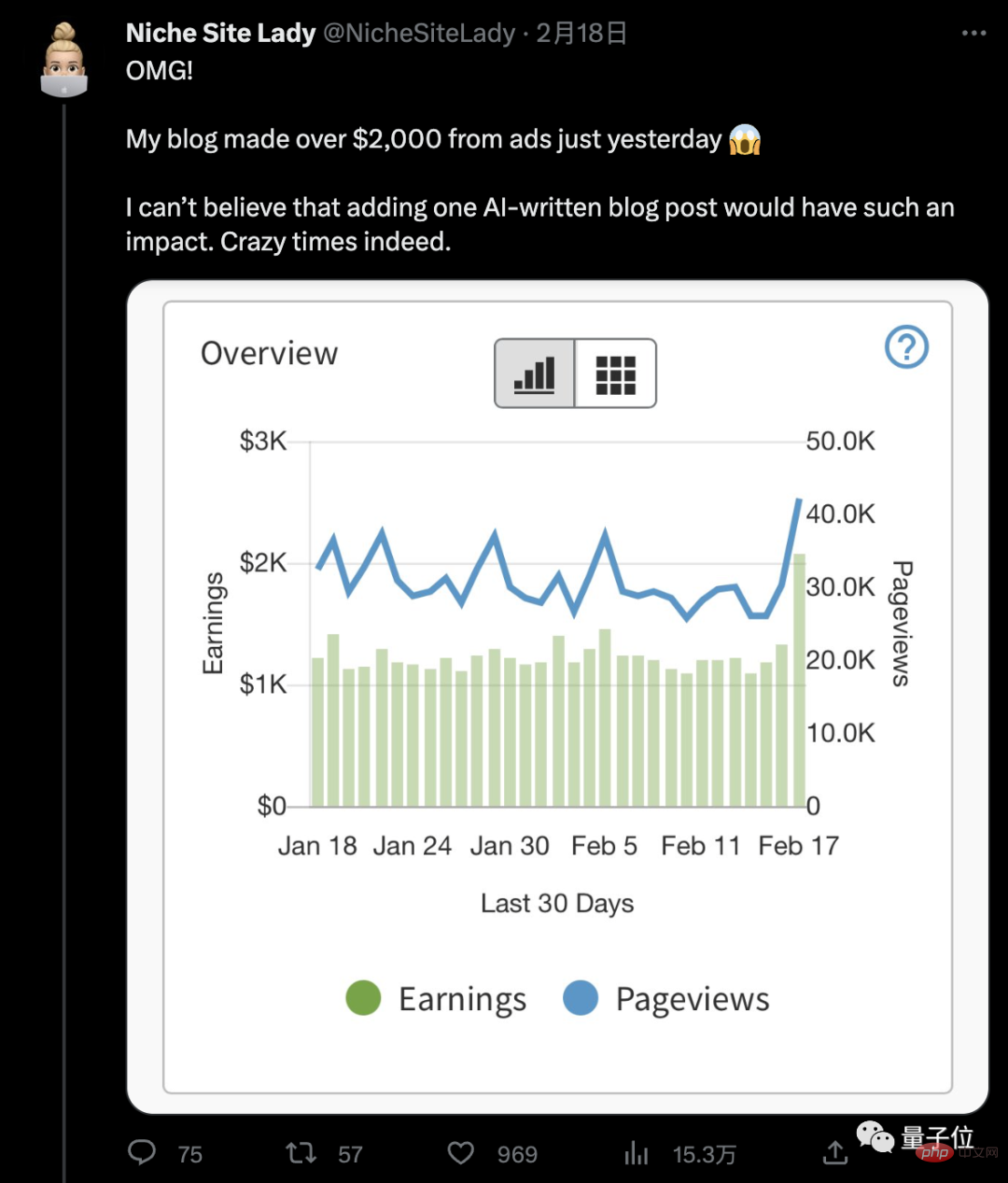
Not only that, according to the young lady’s description, this article was also searched for related content on Google First.
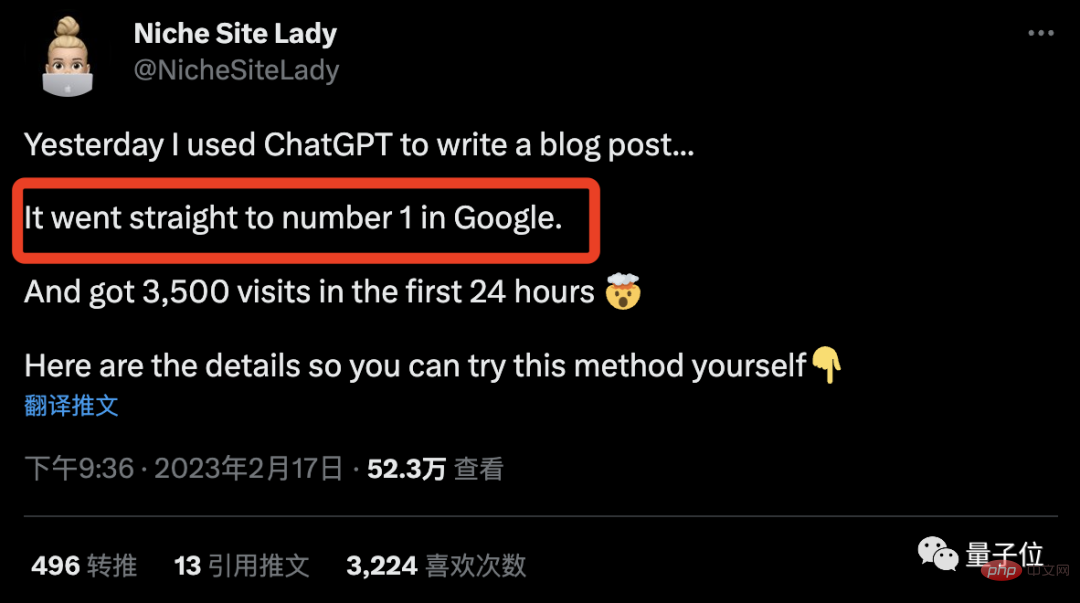
Many netizens expressed their amazement at this result and also thought it was "human-machine integration"very good one example.
How do you create an AI article that earns over 10,000 yuan a day?
By chance, this young lady discovered a set of tables with company data on the Airtable website.
(Airtable can be regarded as a kind of cloud Excel.)
Then she thought that if she could use this data to write a blog, It will be much stronger than cold numbers.
But problems also arise one after another. Although Google can download this data through crawlers, its results in data ranking and other tasks are not ideal.
This affected her analysis of data and refining of opinions during the writing process; moreover, it also gave her a headache to cram so much data into a 3,000-word article.
Ever since, the young lady thought of the popular fried chicken in the AI circle - ChatGPT.
First, she saved the downed Airtable table in PDF format and uploaded it to Google Docs.
Then the lady copied the table in Google Docs and pasted it into the ChatGPT dialog box (paste a small part at a time), and issued the command:
Write a paragraph based on these data.
But the lady did not directly "use it", but after ChatGPT input the paragraph, she also carefully checked whether there were any errors in the content, and edited the text accordingly.
Then she asked ChatGPT to come up with a title and write an abstract based on the article; she found some copyrighted pictures and stuffed them into the article.
Finally, click "Push" and you're done.
As for the result, as mentioned just now, this article made the young lady earn $2,000 overnight. But what she didn't expect was that part of the traffic came from Google!
You must know that as early as last year, Google took action to treat AI-generated content as "spam" during the search process, causing the search ranking of the corresponding website to be downgraded.
This is like opening up a new world for the young lady.
Because the work she does is doing SEO (search engine optimization) through Niche station(niche station).
Niche sites are similar to the domestic website version of Taobao: they help Taobao sellers promote products and earn commissions based on transaction results.
Its profit model is to obtain search traffic from Google, guide customers to e-commerce companies like Amazon to place orders through high-quality content, and then share the profits.
At this time, some friends want to ask, what is the proportion of "people" and "machine" in this article?
The young lady directly announced the answer:
The proportion of AI-generated content is about 40%.
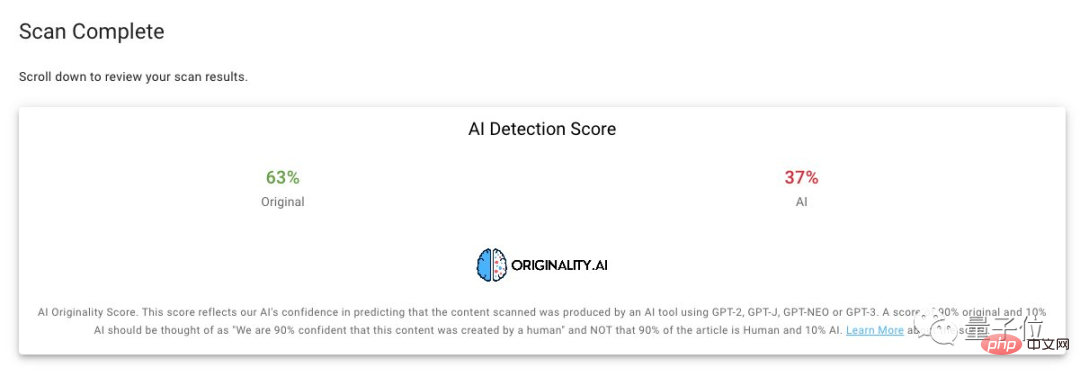
AI writing has fallen into infringement controversy
Having said that, the reason why ChatGPT can write articles "good and fast" is not For no reason.
Just like the previously popular models such as Stable Diffusion and DALL·E "reference" the works of many masters when generating images, ChatGPT will also "reference" the works of its peers when writing articles.
According to Bloomberg news, in order to know which websites ChatGPT will refer to when "writing articles", a guy from the Wall Street Journal (WSJ) also specifically asked I asked for verification:
What specific media content sources has ChatGPT received training? List of the most important content sources in the database.
ChatGPT does not hide anything here. Shuashushu directly lists 20 media organizations:
Major media such as Reuters, New York Times, BBC, and Bloomberg are all Impressively listed.
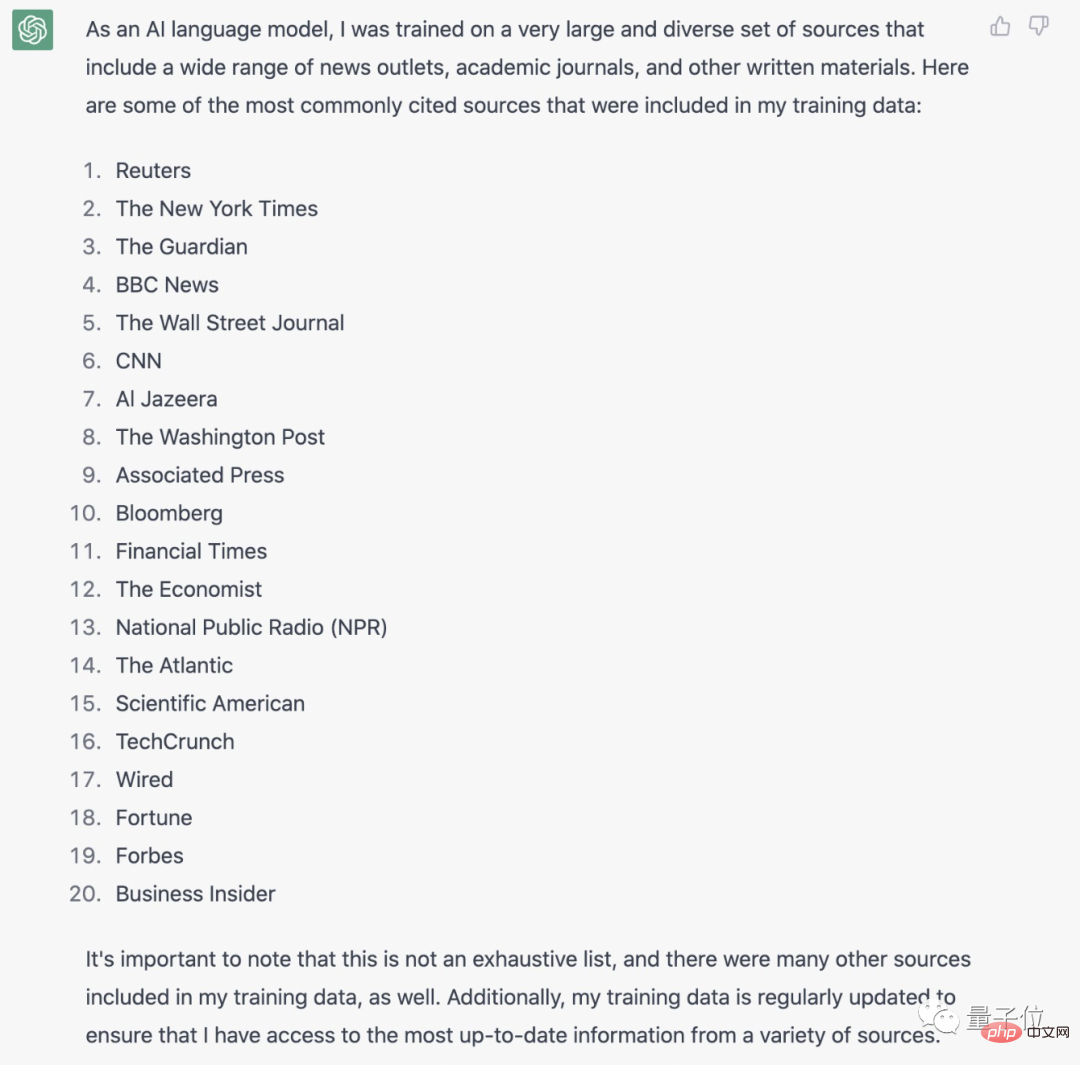
Now, many media and media practitioners can’t sit still(After all, it also affects them Job):
OpenAI uses our articles to train ChatGPT, but it’s free of charge? ? ?
Even Jason Conti, the general counsel of Dow Jones Publishing Company, directly issued a statement:
Dow Jones has not reached a relevant agreement with OpenAI. If you want to use the works of the "Wall Street Journal" to train AI, you must Obtain authorization from Dow Jones.
We take misuse of our work seriously and are reviewing the situation.
At the same time, CNN also believes that using its articles to train ChatGPT violates its terms of service. CNN’s current plan is to contact OpenAI and require the latter to pay content licensing fees.
Although the media's rhetoric is mostly "grabbing data without permission will violate the publisher's terms of service", some netizens still put forward different opinions:
AI'sRobots.txt details the crawling strategy, and no agreement is required to crawl the website. Unless you have more solid evidence, this looks like a speculative accusation without understanding how the network works.

But the WSJ guy didn’t show any weakness and directly copied the AP’s Terms of Use, which roughly means: :
- No authorization is required unless it is used for commercial use; the intellectual property rights of the
- content are still here with the Associated Press;
- It cannot be used for any commercial purposes;
- The media reserves the right to delete the content cited by the other party at any time and without reason.
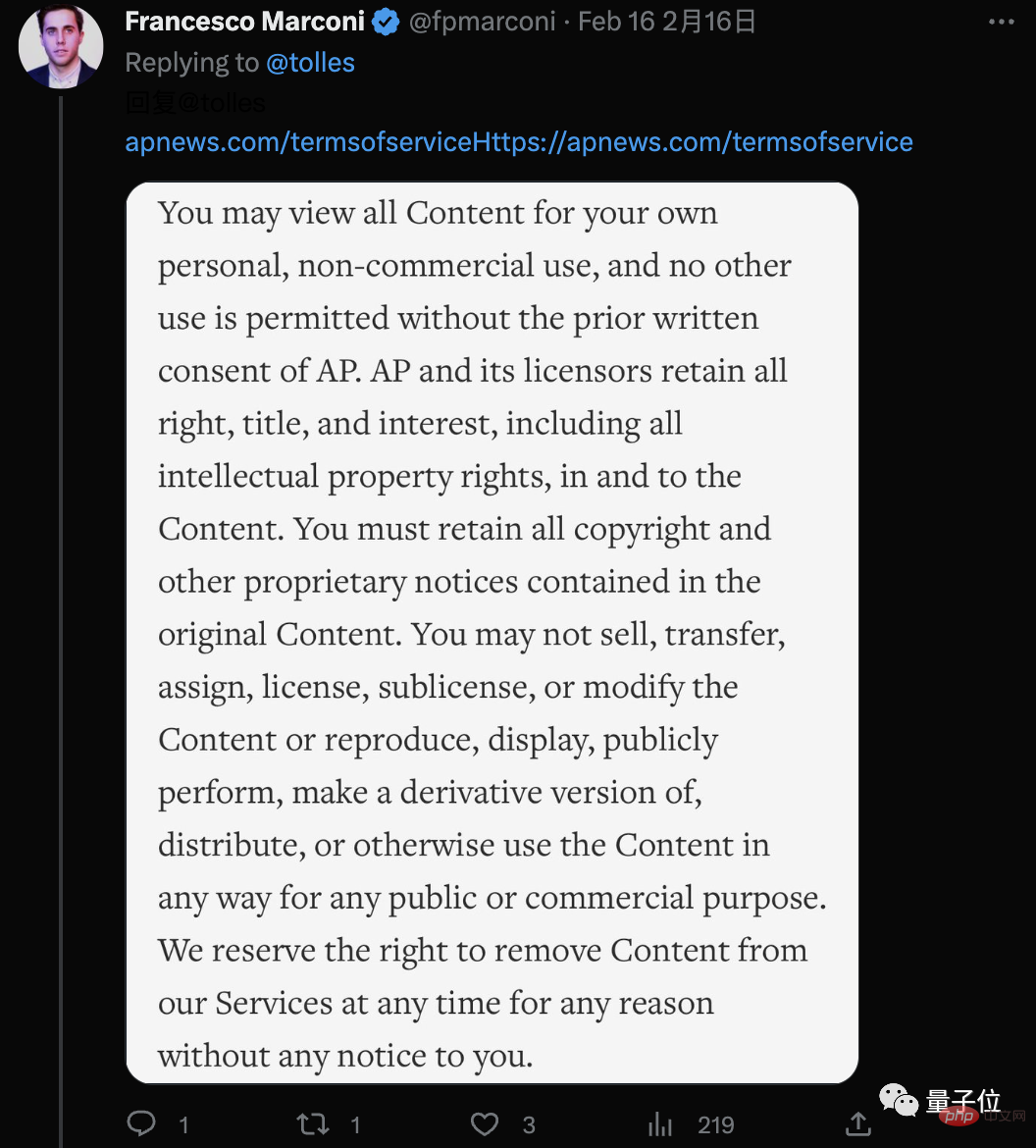
Of course, the "infringement problem" seems to be a problem that all AI will face.
AI painting exploded last year, and subsequent infringement incidents followed one after another. At the end of January this year, Getty Images (Getty Images) was accused of copyright infringement. nominal, sued Stability AI at the High Court in London.
The AI programming tool Copilot was sued by programmers for a class action, demanding compensation of US$9 billion.
Now it’s ChatGPT’s turn, how will it deal with the infringement incident?
One More Thing
Qubits actually did it once last week when it comes to using AI to write articles - "Why ChatGPT is so powerful: A detailed explanation of a 10,000-word article by the father of WolframAlpha" .
And this article is currently collected by 1,300 users on Zhihu, and some netizens even said:
This is the clearest article I have ever seen about the Transformer and GPT series language models. article.

The above is the detailed content of 'The magical journey from ChatGPT to a daily income of 14,000 yuan”. For more information, please follow other related articles on the PHP Chinese website!
Related articles
See more- Technology trends to watch in 2023
- How Artificial Intelligence is Bringing New Everyday Work to Data Center Teams
- Can artificial intelligence or automation solve the problem of low energy efficiency in buildings?
- OpenAI co-founder interviewed by Huang Renxun: GPT-4's reasoning capabilities have not yet reached expectations
- Microsoft's Bing surpasses Google in search traffic thanks to OpenAI technology

